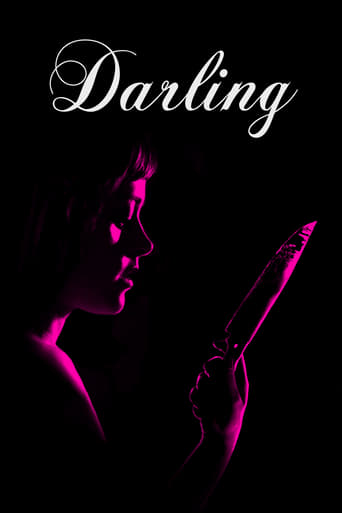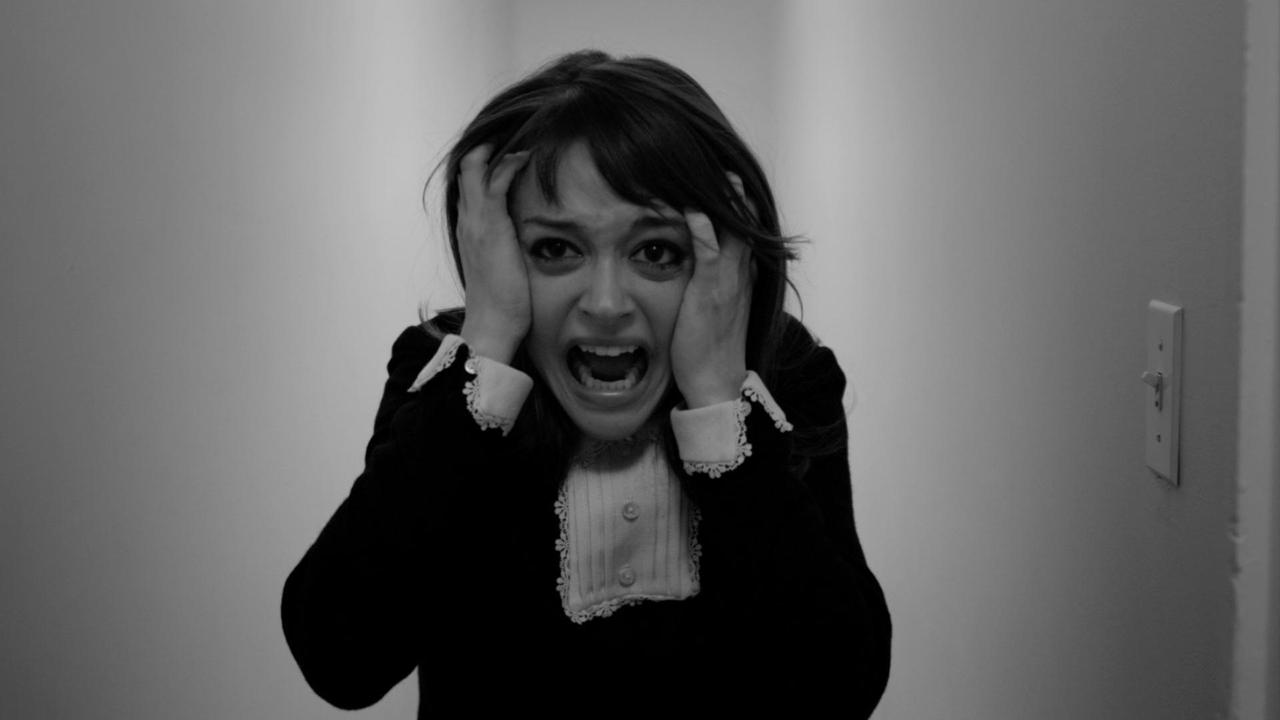thelastblogontheleft
This film was just too pretentious for me to really get into in any meaningful way. I felt like it was trying way too hard to be some kind of quirky, black and white art-house movie and wound up putting more effort into this contrived style rather than making a movie with any substance. Director Mickey Keating — who also directed Pod, which I reviewed recently, which has literally all the same main characters minus Sean Young, as well as the same music composer AND same cinematographer — definitely knew what kind of mood he was aiming for, but he forgot to put any deep thought into things like dialogue or getting a strong performance out of his characters. I'm not entirely surprised, since Pod had the same issues for me — a good shell of a movie but no substantial filling."Darling" (she is given no other name), played by Lauren Ashley Carter, is a mysterious young girl who is tasked with watching an old, beautiful apartment in the heart of New York City while its wealthy residents are away. She is warned that a previous caretaker threw herself off the balcony, and there is talk of the apartment itself being haunted. Throughout the short time that she is house sitting we watch her descent into madness before her tragic end.** SPOILERS! **I guess my biggest issue with this movie is, as I mentioned, the fact that Keating's focus on style and mood seemed to trump his effort to build a meaningful character with Darling. He had this great opportunity to delve into the topics of gentrification, urban isolation, the trauma of possible sexual assault, and mental illness, to name a few, but he seemed to prefer to simply have a pretty girl stare blankly into the camera. We really never get to know much about her aside from studying every facet of her face since she probably stares into the camera for half the damn movie runtime. I had high hopes when the movie opened up with some impressively stark shots of the city — it's a rare treat when a movie seamlessly blends genuine terror and character development with an abundance of aesthetic beauty — but alas, all I got were some cool upside down shots of skyscrapers and enough shock cuts to make me never want to see another one again in my entire life.All of the mentions of a paranormal side of things — the apartment being haunted, the previous caretaker committing suicide, the mention by her date that a conjuring of the devil was once attempted in the building — are all sadly glossed over, despite the fact that they could have been interesting additions to the plot if they were explored a bit more. It does what many other greats before it have done — blurring the line and making us wonder what is truly paranormal and what is a product of spiraling into madness — but it just doesn't do it nearly as well.The murder of her date was unexpected, and somewhat shocking to witness — him gasping awake unexpectedly and the subsequent suffocation with the plastic bag were particularly hard to watch. But ultimately, like most aspects of the movie — I mean, come on, it's broken into chapters for some inexplicable reason — I felt like it was trying a bit too hard.Then the ending just gets plain cheesy, with her talking to Madame on the phone, hinting again at her past trauma, and saying "I think I'll become one of your ghost stories now" *eye roll*.Overall, YAWN. Pretty to look at? Sure. But I would have preferred it spend more time making me think — or, hell, scaring me — than repeatedly juxtaposing her blank expression with a strobed shot of her screaming face.
whineycracker2000
Right off the bat, Mickey Keating's latest film Darling shows real promise. For starters, it is visually stunning: the lighting, set design and black and white cinematography (while imitative) are truly impressive. His shot compositions of New York City even rival Woody Allen's famous, yet overrated opening of "Manhattan. It's undeniable that Keating and company know their craft pretty well, and that has to be applauded. However, the overall end product is lacking in many crucial areas for me, particularly its narrative trajectory and plot, which borrow heavily (I use that word kindly) from early Polanski's "Apartment Trilogy",among other films in the "female losing grip on reality" (i.e. Carnival of Souls) subgenre. Obviously, anybody who has been schooled in these films can clearly see that Keating's effort is really just a modern, pimped-out mashup, but with a pretentious, student film-like execution that lacks a unique vision or a genuine exploration into the pathology of it's lead character. In other words, Darling looks great, but gives audiences very little to process.I could have forgiven the film's plagiaristic nature if it had something authentic, unique, or timely to say about its hinted-at themes of isolation, female sexual repression, mental illness, urban alienation, or anything for that matter -but it doesn't. The film is an exercise in style and, well, literally nothing else. I am not convinced Keating has any idea who his main character is, or truly even cares; she is merely a prop (admittedly a very lovely one). Instead of giving audiences any type of backstory, Keating relies on the now-exhausted "descent into madness" theme; borrowing heavily from films such as 1980's The Shining's exploration of the murky area between mental and metaphysical chaos. However, here this approach is really just used as a lazy device to demonstrate Keating's technical virtuosity, while allowing him to exercise his giddiness over the entire filmmaking process. However, the filmmaker's ego ultimately compromises the integrity of the film, rendering it a hollow shell devoid of meaningful content.In addition to its shallow and derivative vibe, Keating's film is hampered by a seriously flawed and unconvincing portrayal of Darling herself, played by the purportedly budding indie "star" Lauren Ashley Carter. Without beating around the bush, I can only say that Carter's performance simply belies any credibility and comes across as wooden, self-aware, and curiously arrogant. I couldn't help but imagine her trying to stay in character, while making a valiant attempt to adhere to Keating's rigid physical instructions, with a "step-by-step" dutifulness (literally, it seemed like she was walking an invisible tightrope the whole time). Watching her, I got the sense that Keating was directing her based on shot construction and lighting schemes rather than character development/arc or story advancement. After watching Keating's film I was compelled to go back and reflect on specific scenes from the films that clearly inspired it. Remembering Catherine Deneuve in "Repulsion", Candace Hilligoss in "Carnival of Souls", or more recently, Angela Betis in 2002's underrated "May"- I couldn't deny the undeniably stark contrast between the craft and depth of those memorable performances and Carter's here. It became clearer to me that there simply is no subtlety, nuance, or honesty in Carter's performance or Keating's film as a whole. Alas, Darling completely lacks the particular combination of originality and vision that made its progenitors so enduringly effective. Instead, what we are left with is a series of random shots and jarring noise that are devoid of context or purpose. It's really too bad, because as mentioned earlier, Darling is a visual feast; and given a more original script, clarity of purpose, and effective lead, it might have been something truly inspired and influential in its own right.
Phil Tennant
Firstly, I would not class this movie as horror, more a Psycho Thriller. The fact that it takes place in an allegedly haunted house, (which is set out for us very clearly by the home owner right at the beginning of the movie, and we are then reminded of this half way through by another character, in case we have forgotten.) seems incidental. My "Pretension Alarm" started ringing straight away, and there were several reasons.1) Filmed in black and white. Not necessarily a bad thing, look at Carnival of Souls among others. Here it just serves to amplify the dullness of the story. 2) Separated into "Chapters". As there is no real change in the story, or jumping to a different location, or even a change of scene sometimes, this seems superfluous. Perhaps they are trying to fool us into thinking we are watching something intelligent by reminding us of books. 3)Throughout several scenes there is French music playing in the background, á la Edith Piaf. Although the location is never detailed, apart from a brief glimpse at a characters driving licence, it looks like 1960's New York. So why French music? It does nothing but detract from what little action is going on. 4)Constant (and I mean A LOT) of cut away shots of the girl staring into the camera from varying distances, with various expressions (Although not that varied) inter-cut with flashes of screaming faces, while discordant music screeches in the background. 5)Very little dialogue. A lot of the time is taken with the girl alone in the house walking around, so the lack of dialogue is unsurprising, but most of what is included is painfully clumsy, so this is probably a plus. 6)The ending is predictable within the first 5 minutes of the movie.I could sum up the plot of this film in three sentences, and would probably have a sentence to spare, and still not be missing anything out. But no spoilers
As you can tell, not a fan of this one, it tries so hard to be artful and avant-garde, but is just Pretentious Claptrap.
CinemaClown
Shot in black n white, arranged in non-chronological order, and evidently influenced by Roman Polanski's Apartment Trilogy (especially Repulsion), there is no denying that Darling is a stylishly directed feature but in its overambitious attempt to homage the notable horror classic, it ends up becoming an overbearing & convoluted mess.Set in New York, the story of Darling follows an unnamed young woman who agrees to house sit at a large mansion that appears to have a notorious past. With nothing to do & unable to kill time, she begins to lose her grasp on reality as the extended exposure to the isolation that abounds the empty mansion triggers her descent into madness.Written & directed by Mickey Keating, Darling is his tribute to the atmospheric chillers of the 1960s but the film lacks an identity of its own. Throughout its 78 minutes runtime, it applies tricks such as sporadically cutting to maniacal frames, screeching noises for its score & mindless meandering but all its intricacy lies only on the surface, for it is hollow from the inside.The monochrome filters, confined setting & clever use of camera do manage to bring an unsettling element into the picture but the narrative is simply out of focus and fails to capitalise on that. The only one who is actually able to redeem something out of this whole clutter is Lauren Ashley Carter who tries her best to make her character work and chips in with a violent performance.On an overall scale, Darling finds its filmmaker succeeding at replicating the look of Repulsion but he is unable to add the same level of thematic depth which turned that psychological horror into a genre classic. Deficient in numerous storytelling aspects & pretending to be something it isn't, this artistic endeavour bounces all over the place yet in the end, finds itself not far from where it started. Skip it.


 AD
AD



